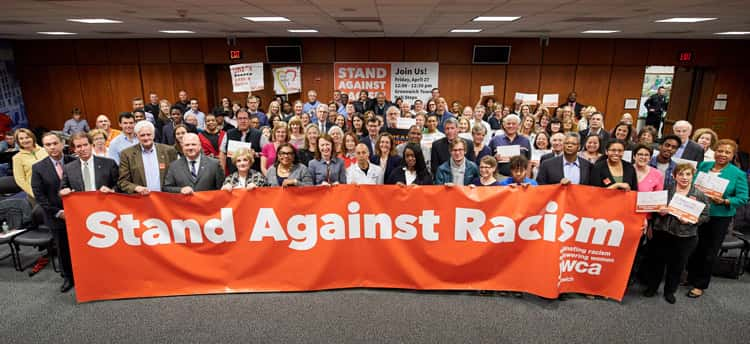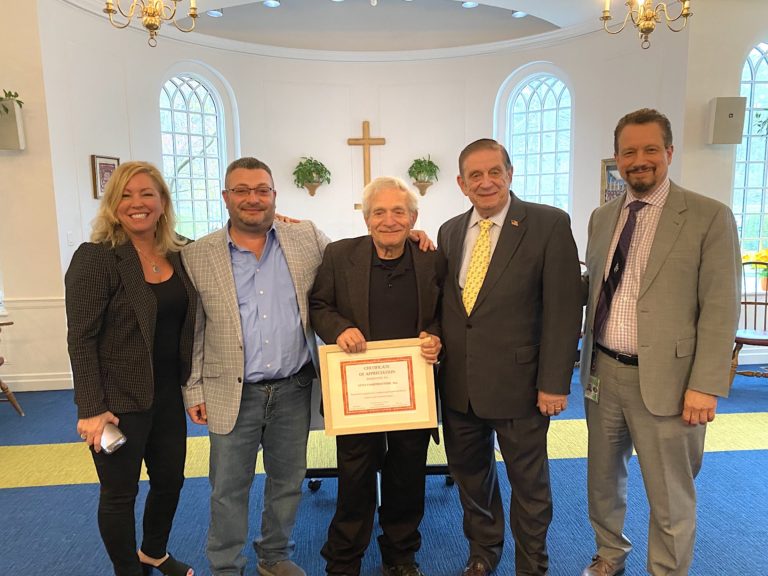A Sense of the Meeting Resolution criticizing First Selectman Fred Camillo and the Board of Estimate and Taxation for actions taken during the coronavirus pandemic failed to receive overwhelming support during the RTM’s meeting on Monday night, as it was defeated by a vote of 75 in favor, 138 against, with 16 abstentions.
Last month, Camillo appropriated $100,000 to the Greenwich United Way as part of the town’s newly-formed COVID-19 Community Relief Fund, which was established to provide disaster relief and recovery efforts for Greenwich residents experiencing economic hardship due to the pandemic. Beneficiaries have included organizations such as Abilis, Filling in the Blanks, Food Rescue US, Jewish Family Services and YWCA of Greenwich, among others.
According to the town charter, any disbursal of funds exceeding $5,000 must gain final approval from the RTM. However, Camillo said, due to the emergency situation and the need to act quickly on getting people help, he did not go to the RTM.
The resolution before the RTM on Monday called for the First Selectman and BET to “show better judgement” when invoking emergency appropriations, and to allow the RTM to have the final say.
“Approval of spending is the most important authority the RTM has. No effort was made to reach out to the RTM here,” said RTM Moderator, Thomas Byrne, who yielded this portion of the meeting’s agenda to Moderator Pro Tempore, Alexis Voulgaris.
Bill Galvin, Vice Chair of the RTM’s Health and Human Services Committee, said that there was no attempt made by Camillo or the BET to determine if the RTM could assemble virtually or otherwise for a special meeting. Galvin also said that while the funds were disbursed to the United Way on March 20, grants didn’t go out until April 20, one month later, “something which is not indicative of an immediate financial emergency.”
Camillo spoke about the appropriation and ran through a timeline of what occurred.
After schools closed on March 11 and Gov. Ned Lamont issued an executive order limiting large gatherings, he began to discuss what to do about children in town on free and reduced lunch.
A group called “Greenwich Comes Together” was founded to help those in need, and Camillo said over $100,000 was raised in the form of checks and Personal Protective Equipment donations. He then received a call from David Rabin, President and CEO of the Greenwich United Way, asking about a Public Private Partnership, and the COVID-19 Community Relief Fund was created.
Camillo said he consulted with members of the Emergency Operations Task Force and the town attorney before going to the BET with the appropriation.
Camillo argued that at the time in mid-March, it wasn’t yet known if meeting virtually with the RTM was a possibility, as their first test run of the Zoom Meeting software occurred on April 7, and the first real virtual meeting happened on April 20.
If the town had waited until April 20, Camillo said the money would have been released substantially later because the grant process is lengthy. “We did this with lightning speed and it still took a month,” Camillo said.
“In an international public emergency, I didn’t have the benefit of hindsight. I made decisions in real time, and I did so in collaboration with members of the Emergency Operations task force, and our town attorney,” Camillo continued. “At the end of the day, we made the decisions with the health, safety, and welfare of our citizens at heart… I respect the process very much, but we did the right thing here. Shame on me if I had waited. If we knew we could’ve met virtually, I absolutely would have done it that day. But no one knew. We were right at the beginning of this.”
RTM members debated the resolution at hand.
Mary Ellen Markowitz from District 2 said nonprofits are hurting, and the most vulnerable in the community are in danger.
“It was clear at the time that a tsunami was about to hit our shores. We are in a crisis, the likes of which we have not seen in my lifetime. Time was of the essence. Fred acted accordingly,” she said.
Brian Raney from District 9 urged members to support the resolution, adding that it was not about the United Way and the work they do, but more about process.
“The road to hell is paved with good intentions, and everyone had good intentions, yet from my point of view, we breached the charter,” Raney continued. “I am shocked more people are not frankly outraged that this happened without any consultation of the RTM. It certainly outrages me that this went on,” he said.
The original resolution, which was crafted a month ago and signed by RTM Moderator Thomas Byrne, included a paragraph that called for the Town of Greenwich, within two days of the May 11 meeting, to partially reopen parks, golf courses, and beaches with reasonable restrictions and guidelines.
However, that portion of the resolution was rendered moot after Camillo began to ease restrictions at parks and marinas last week.
RTM member Dan Quigley, from District 1, said the amended resolution was nothing more than an attack on Camillo.
“This has nothing to do with process. This has to do with going after the First Selectman in the throws of the greatest national emergency our country has seen probably since World War II,” he said. “I believe that Fred Camillo, the Board of Selectmen, and the BET acted the right way and in their actions, they expedited funds to the neediest in our town who needed it in an emergency.”
Laura Gladstone from District 2 said the appropriation of $100,000 to the United Way “displays poor judgement and sets bad precedent.” She argued that the town has experienced other emergencies before, such as 9/11, Hurricane Sandy, and the Great Recession of 2008. In all of those instances, she said, the RTM was not cut out.
“If the First Selectman wanted to meet with the RTM, he could’ve easily called a special meeting like they did for the Julian Curtiss roof last year using Zoom, or even the phone, and not circumvent the RTM altogether,” she said. “During a state of emergency, cooler heads should prevail and not knee jerk reactions. There was no information given as to why the United Way was chosen out of the thousands of charities in Fairfield County. We all donate to charities and we do not need the government deciding where our charitable donations should go.”
Byrne echoed those sentiments, saying that the town has a system of checks and balances “that ensures that spending decisions are made by the many, and not by the few.”
He recalled an incident from May 1998 when a sewer line broke near Steamboat Road, and the town needed emergency funds to fix it. “A call was made to the RTM, to the moderator, to see how we could work together to not cut the RTM out,” he said.
Gary Dell’Abate, co-chair of the Parks and Recreation Department, spoke in support of Camillo and how he has handled the pandemic. He added that because Greenwich became a hotspot for coronavirus, decisions had to be made differently than in other towns.
“This is what we’re wasting our time on? If you want to go on record to feel that you’re right about holding up badly needed funds for people, well, congratulations. When they write the book on the pandemic, history will judge you accordingly,” he said.
At the end of April, it was announced that the Greenwich United Way’s Greenwich COVID-19 Community Relief Fund surpassed its initial $500,000 goal after a recent large gift from an anonymous donor. The fund is now increasing its target to $600,000.




